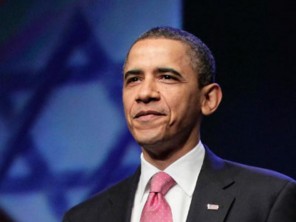JERUSALEM – After a bruising confrontation with President Obama over his call for a peace deal based on Israel’s 1967 boundaries, Israeli Prime Minister Binyamin Netanyahu and his aides are playing down the dispute, calling reports of a crisis overblown.
Their comments came as Obama gave a reassuring speech to the pro-Israel lobbying group AIPAC on Sunday, and Israeli commentators noted that the boundaries in question have long been considered the baseline for any future agreement with the Palestinians.
President Barack Obama warned America’s pro-Israel lobby on Sunday that the Jewish state will face growing isolation without a credible Middle East peace process. (May 22)
President Obama and Prime Minister Netanyahu reported making no progress toward peace in the Middle East during their meeting at the White House. (May 20)
Netanyahu’s allies, meanwhile, expressed satisfaction with his firm stance in Washington, which analysts said was adopted largely with domestic politics in mind.
Taking their cue from Netanyahu, who after lecturing Obama at the White House on the perils of withdrawing to the 1967 lines said Saturday that the disagreements “have been blown way out of proportion,” the prime minister’s aides reassured Israelis that the dispute had not undermined bilateral ties.
Yaakov Amidror, Netanyahu’s national security adviser, said the prime minister told his staff members after speaking with Obama on Friday that he had come away reassured after the president clarified points he had made in his speech Thursday, in which he called for a two-state solution based on Israel’s 1967 boundaries.
“Contrary to the headlines, the disagreement is far less deep,” Amidror told Israel Radio, speaking from Washington. “My sense is that the headlines don’t correspond with reality.”
Amidror said that Israeli officials were pleased that Obama had rejected Palestinian attempts to secure recognition of statehood at the United Nations, that he backed Israel’s refusal to negotiate with a Palestinian leadership that includes the militant group Hamas, and that he asserted that a two-state peace deal must affirm that Israel is the Jewish state.
Netanyahu spokesman Gidi Schmerling told Israeli Army Radio that the U.S.-Israeli alliance remains unshaken and that “on most points, we do agree with the American administration.”
Explaining Netanyahu’s objection to Obama’s reference to the 1967 boundaries, Schmerling said the formula suggested that “we’re beginning the negotiations with a discussion of the 1967 lines first, and the question is, what comes next? That’s very problematic for us.”
But Israeli commentators pointed out Sunday that the 1967 lines have for years been considered the basis for any future border between Israel and a Palestinian state, noting that Obama had mentioned land swaps that could leave large settlements inside Israel, as Netanyahu has demanded.
“What did Obama say?” wrote Ofer Shelah, a columnist in the Maariv newspaper. “That any agreement with the Palestinians, if and when it is signed, must be based on the 1967 lines with border adjustments. Is there any Israeli or Palestinian who doesn’t know that this is what will happen? It’s the only game in town.”
Dov Weisglass, who was chief of staff to then-Prime Minister Ariel Sharon, said in a radio interview that “anyone here deluding himself. . . that the drawing of the new map will be based on any reference point other than the 1967 boundaries is simply disconnected from reality.”
Still, hawkish members of Netanyahu’s Likud party and his allies in the governing coalition pronounced themselves satisfied with his performance in Washington.
“The prime minister had no choice but to bring up the substantial disagreements between both sides,” said Moshe Yaalon, the minister of strategic affairs and a senior Likud member. “Otherwise, we would have found ourselves on a slippery slope, diplomatically and in terms of security. We have to protect our interests.”
Netanyahu’s tough talk has reaped dividends, wrote Yossi Verter, political analyst for the newspaper Haaretz.
“Netanyahu’s behavior in the American capital so far strengthens his coalition,” Verter wrote. “Netanyahu is consolidating his position as the leader of the right in Israel.”




